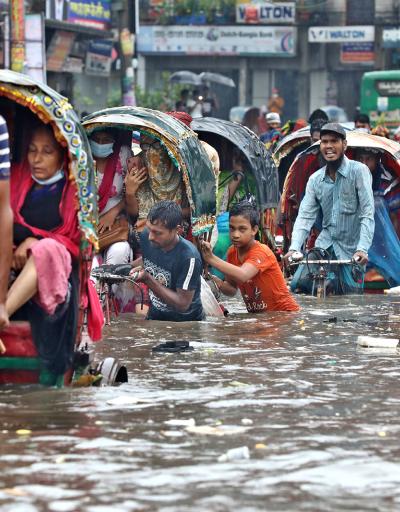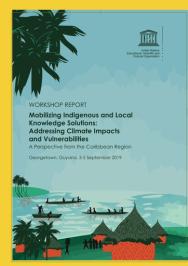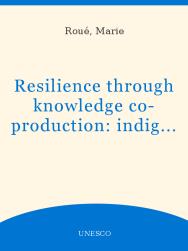
Local and Indigenous Knowledge Systems and Climate Change
Indigenous responses to normal climatic variances and ecosystem opportunities have allowed them to thrive in diverse environmental contexts including deserts and semi-arid areas, tundra, savannah grasslands, oases, rainforests, dryland forests, boreal forests, coastal and marine ecosystems, on small islands and at high altitudes. Although this adaptability has served them well for millennia, it also puts them on the frontlines of climate changes and its impacts at different scales.
To face these challenges, Indigenous Peoples and local communities are obliged to mobilize and enhance their knowledge of their territories and natural resources to constantly adjust to unprecedented variances, extreme weather events and slow onset effects of climate change. Indigenous Peoples in particular have also become engaged in national and international scientific and policy processes, with the international system having accommodated and recognized the substantial knowledge and experience that they bring with them.
For local communities, the impacts have been equivalent, particularly for those on low-lying atolls, and communities reliant on rainfed agriculture, pastoralism, artisanal fishing and nature-based livelihoods. Local communities are recognized by the UN system but there is not an equivalent framework for participation or dynamics of self-organization. The 2018 United Nations Declaration on Peasants and Other People Working in Rural Areas goes some way to strengthening such recognition. The Local Communities and Indigenous Peoples Platform (LCIPP) of the United Nations Framework Convention on Climate Change (UNFCCC) was designed specifically to include the voices of local communities within the Convention’s processes.
LINKS has long been active in climate change knowledge research, dialogue and advocacy with its scientific, policy, Indigenous Peoples and local community partners. LINKS contributes to the overall UNESCO strategy on climate change responses.

Climate policy and knowledge systems
Local and Indigenous knowledge systems contribute to the achievement of Sustainable Development Goal 13 on climate action by observing changing climates, adapting to impacts and contributing to global mitigation efforts.
UNESCO, together with the International Council of Monuments and Sites (ICOMOS) and international authors, produced an up-to-date summary of the connections between Indigenous Peoples, culture, knowledge and climate change, entitled “Intangible cultural heritage, diverse knowledge systems and climate change”. This white paper is a contribution to the International Co-Sponsored Meeting on Culture, Heritage and Climate Change (ICSM CHC).
Human communities, especially Indigenous Peoples and those more directly reliant on the environment for subsistence, are already negatively impacted by the loss of ecosystem functions, replacement of endemic species and regime shifts across landscapes and seascapes (high confidence). Indigenous knowledge contains unique information sources about past changes and potential solutions to present issues (medium confidence).
The main global policy instruments of relevance to Indigenous Peoples and local communities include the following:
Intergovernmental Panel on Climate Change (IPCC)
UNESCO-LINKS was engaged in the development of the 5th Assessment Report (AR5) of IPCC, which began to highlight the importance of Indigenous, local and traditional knowledge systems for climate adaptation, and emphasized the need for greater attention to understanding such contributions and improving the ability of policy to consider multiple approaches to evidence. The key work in this regard was conducted by Working Group II: Summary for Policy Makers, WGII, IPCC, 2014
“Adaptation planning and implementation at all levels of governance are contingent on societal values, objectives, and risk perceptions (high confidence). Recognition of diverse interests, circumstances, social-cultural contexts, and expectations can benefit decision-making processes. Indigenous, local, and traditional knowledge systems and practices, including Indigenous Peoples’ holistic view of community and environment, are a major resource for adapting to climate change, but these have not been used consistently in existing adaptation efforts. Integrating such forms of knowledge with existing practices increases the effectiveness of adaptation.” AR5 Summary for Policymakers 2014
The 6th Assessment Report (AR6) examines the issues related to climate change and Indigenous Peoples and local communities. Building on AR5 and LINKS’ engagements with the IPCC and Working Group II, AR6 provides the most informed summary of how Indigenous Peoples and local communities are being impacted by climate changes, and also how they are applying their knowledge to adapt and cope with impacts.
UN Framework Convention on Climate Change (UNFCCC)
The UN Framework Convention on Climate Change (UNFCCC) is the main treaty and legal instrument that shapes multilateral agreements on reducing greenhouse gas emissions and supporting policies that respond appropriately to climate change. Multilateral decisions are taken by various bodies under the Convention at the annual Conference of the Parties (COP).
Most of the work related to Indigenous Peoples and local communities has emerged under the stream of work on climate adaptation. There have been several key moments in the evolution of the mechanisms and principles, and LINKS, together with its partners, has been active in each of these processes.
Guidelines for National Adaptation Programmes of Action (NAPAs) were formalized in 2001 at the UNFCCC COP 7 in Marrakech, Morocco. Although these instruments did not highlight Indigenous Peoples, in practice they were designed to take into consideration local needs and elaborate national frameworks. A number of NAPAs gave consideration to local knowledge systems and the presence of Indigenous Peoples.
The Nairobi Work Programme on Impacts, Vulnerability and Adaptation to Climate Change, which provided a forum for Indigenous Peoples, local communities and civil society to engage with each other on adaptation practices, was formalized during COP 12, in 2006.
The Cancun Adaptation Framework, an architecture that created opportunities for Indigenous Peoples and local communities to engage more directly on issues of concern while creating a coherent architecture within the Convention, was established during COP 16 in 2010.
Reports by the Nairobi Work Programme (NWP) partners dealing with Indigenous and local knowledge were taken into consideration during COP 19 (Warsaw, Poland, 2013). The Adaptation Committee recognized that these reports were an important contribution and recommended that NWP be given a mandate to elaborate this as a work stream, with a concept paper and expert consultations. This COP 19 decision fast-tracked the attention of the Convention to the role of Indigenous and local knowledge holders.
Paris Agreement on climate change
An historic agreement, known as the Paris Agreement, was adopted under the UNFCCC during COP 21 (Paris, France, 2015). The instrument was the first to shift from a binding multilateral agreement to a process that was anchored in Nationally Determined Contributions, i.e. governments would hold themselves to their own targets and measures, within an agreed global framework and timeline.
It was the Paris Agreement which brought together consensus on the interaction of climate policy and social issues, including human rights, gender equality and the rights and contributions of Indigenous Peoples. Indigenous Peoples and local communities’ issues are cited in several places in the text, with article 7.5 on adaptation action as the key operative article.
Art. 7.5 Parties acknowledge that adaptation action should follow a country-driven, gender-responsive, participatory and fully transparent approach, taking into consideration vulnerable groups, communities and ecosystems, and should be based on and guided by the best available science and, as appropriate, traditional knowledge, knowledge of Indigenous Peoples and local knowledge systems, with a view to integrating adaptation into relevant socioeconomic and environmental policies and actions, where appropriate.
Local Communities and Indigenous Peoples Platform
Following the adoption of the Paris Agreement, Indigenous Peoples advocated for a body within the convention that would provide a platform for their issues, ranging from their rights to their role in implementation and knowledge sharing within the framework of the convention. The Parties agreed to this, with key negotiations and operationalization taking place over several COPs.
The Local Communities and Indigenous Peoples Platform is guided by a Facilitative Working Group that combines nationally designated experts and Indigenous Peoples from the seven socio-cultural regions.
LINKS actions on climate change
UNESCO-LINKS has a long history of actions at different scales on the promotion of Indigenous and local knowledge within climate change processes and policy making. Its Climate Frontlines initiative promotes local and Indigenous knowledge and its inclusion in global climate science and policy processes. Working at local, national and global levels, LINKS strives to strengthen Indigenous Peoples and local communities, foster transdisciplinary engagements with scientists and policy-makers and pilot novel methodologies to further understandings of climate change impacts, adaptation and mitigation.
Outcomes of events and conferences
Report of the workshop held in Georgetown, Guyana in September 2019

Nairobi, Kenya on 27-28 June 2018

Organized in Marrakech, Morocco ahead of COP 22.

Organized ahead of COP 21 and the adoption of the Paris Agreement.

Publications






